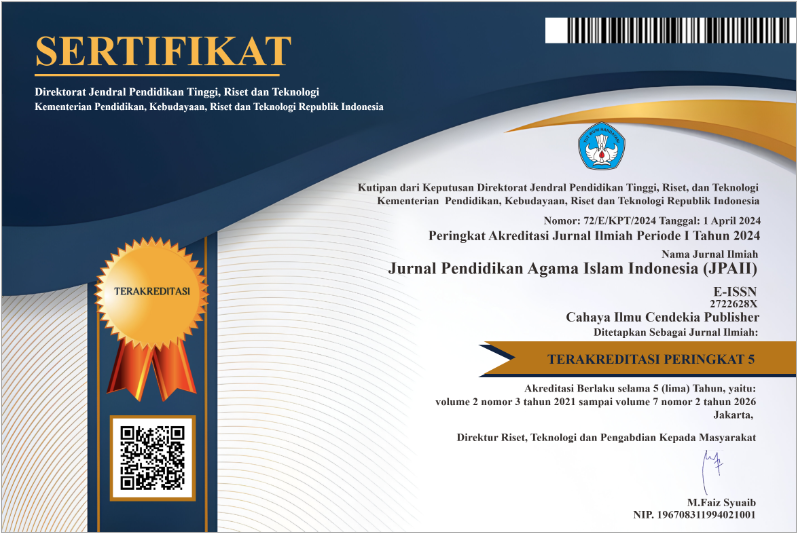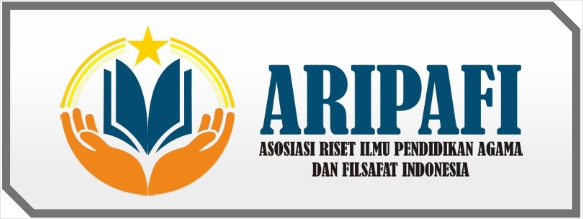Nulturing Local Culture: Social Education Values in Fida' Activities in Tingkir Tengah Subdistrict, Salatiga City
Abstract
Purpose of the study: The aim of this research is to determine the values of social education with Fida' activities in Tingkir Tengah Subdistrict, Salatiga City.
Methodology: This research is qualitative research, namely research that is descriptive, explaining in detail the object being studied. Data research in the form of written or spoken words obtained from people who observed. This research seeks to determine the values of social education in Fida' activities in Tingkir Tengah sub-district.
Main Findings: The findings of this research show that the values of social education Contained in Fida' activities include: (1) establishing ukhuwah islamiyah (2) togetherness (3) mutual help. These findings show that in religious activities it is not only about pursuing rewards, however also social interaction with other people, not just concerned with khablumminallah but also khablum minannas
Novelty/Originality of this study: The integration of social education values through Fida' activities in Tingkir Tengah Village, Salatiga City is an interesting innovation. By combining educational approaches and social activities, this program not only provides practical knowledge to the community regarding philanthropic and humanitarian activities, but also encourages active participation in building social solidarity in the community. By providing social values as the core of Fida' activities, this initiative does not just disseminate information, but also shapes the character and social awareness of residents, bringing a sustainable positive impact to the development of society in Tingkir Tengah Subdistrict.
References
M. R. M. Nor and M. K. Ibrahim, “From separation between state and religion to religion-freeing state: the changing faces of secularism in Turkey,” Indones. J. Islam Muslim Soc., vol. 13, no. 1, pp. 85–114, 2023, doi: 10.18326/ijims.v13i1.85-114.
R. Tabroni and Idham, “From radical labels to moderate Islam: the transformation of the Salafism movement in Indonesia,” Indones. J. Islam Muslim Soc., vol. 13, no. 2, pp. 279–306, 2023, doi: 10.18326/IJIMS.V13I2.279-306.
A. Albert, I. Iswantir, F. Ismail, and Z. Zainir, “Gagasan Integrasi Nilai-Nilai Adat Basandi Syarak Syarak Basandi Kitabullah (Abs Sbk) Kedalam Pelajaran Pendidikan Agama Islam Pada Kurikulum Sekolah Dasar,” J. Pendidik. Indones., vol. 3, no. 11, pp. 1002–1013, 2022, doi: 10.36418/japendi.v3i11.1286.
M. Chowdhury, “Emphasizing Morals, Values, Ethics, and Character Education in Science Education and Science Teaching.,” Malaysian Online J. Educ. Sci., vol. 4, no. 2, pp. 1–16, 2016, [Online]. Available: https://files.eric.ed.gov/fulltext/EJ1095995.pdf.
P. H. I. Jaya, Saptoni, and M. I. Haq, “Islamism without commotion: the religious transformation of Tuak Kampong in West Lombok,” Indones. J. Islam Muslim Soc., vol. 13, no. 1, pp. 29–56, 2023, doi: 10.18326/ijims.v13i1.29-56.
Iskandar, Waridin, and D. D. Iskandar, “The potential of Muslim Friendly Hospitality in the tourism industry in Central Java,” Indones. J. Islam Muslim Soc., vol. 13, no. 1, pp. 169–197, 2023, doi: 10.18326/ijims.v13i1.169-197.
E. W. WINARNI, E. P. PURWANDARI, H. LUSA, and S. DADI, “The Impact of Thematic Learning Integrated ICT in Tabot Bengkulu as Cultural Ceremony toward Social Interaction Knowledge in Elementary School,” Asian J. Educ. Train., vol. 4, no. 2, pp. 70–74, 2018, doi: 10.20448/journal.522.2018.42.70.74.
D. Aswita, E. Apriana, Herlina, Abubakar, and M. Azzarkasyi, “the Potential Role of Panglima Laôt for Sustainable Marine Ecotourism Development Based on Islamic Culture,” J. Ilm. Islam Futur., vol. 23, no. 2, pp. 218–234, 2023, doi: 10.22373/JIIF.V23I2.16272.
S. Gunara, T. S. Sutanto, and F. Cipta, “Local knowledge system of Kampung Naga: A study to investigate the educational values of indigenous people in transmitting religious and cultural values,” Int. J. Instr., vol. 12, no. 3, pp. 219–236, 2019, doi: 10.29333/iji.2019.12314a.
R. D. Nopryana and I. Susilowati, “The Relation of Religion and Culture in the Review of Indonesian Islamic Community Development,” Int. J. Adv. Sci. Educ. Relig., vol. 5, no. 3, pp. 104–111, 2022, doi: 10.33648/ijoaser.v5i3.215.
F. C. Wibowo et al., “(ISO) Media for improving learning quality using analysis RapidMiner,” AIP Conf. Proc., vol. 2320, no. March, 2021, doi: 10.1063/5.0037556.
M. L. Baehaqi and M. Murdiono, “Strengthening Discipline Character of Students at Muhammadiyah Boarding-School (MBS) Muhiba Yogyakarta,” Din. Ilmu, vol. 20, no. 1, pp. 63–82, 2020, doi: 10.21093/di.v20i1.1671.
J. Nilsson and C. F. Helgesson, “Epistemologies in the wild: local knowledge and the notion of performativity,” J. Mark. Manag., vol. 31, no. April 2015, pp. 16–36, 2015, doi: 10.1080/0267257X.2014.977332.
S. Kusairi, S. Muhamad, N. A. Razak, and A. P. Trapsila, “The role of local wisdom ``Ugahari’’ and the impact of internet and mobile technology on work-life-balance during COVID-19 outbreak: Data set from malaysian workers,” Data Br., vol. 40, p. 107779, 2022, doi: 10.1016/j.dib.2021.107779.
A. Syahza, Suwondo, D. Bakce, B. Nasrul, and R. Mustofa, “Utilization of peatlands based on local wisdom and community welfare in Riau Province, Indonesia,” Int. J. Sustain. Dev. Plan., vol. 15, no. 7, pp. 1119–1126, 2020, doi: 10.18280/IJSDP.150716.
H. McLaren, M. Jones, and E. Patmisari, “Multicultural Quality of Life: experiences of a South Australian Muslim community amid the COVID-19 pandemic,” Indones. J. Islam Muslim Soc., vol. 13, no. 1, pp. 57–84, 2023, doi: 10.18326/ijims.v13i1.57-84.
A. C. Bunger, E. I. Navarro, and C. C. Lewis, “How Do Peers Shape Mental Health Clinicians’ Attitudes Toward New Treatments?,” Adm. Policy Ment. Heal. Ment. Heal. Serv. Res., vol. 48, no. 3, pp. 440–449, 2021, doi: 10.1007/s10488-020-01096-1.
T. Islam and A. Chaudhary, “Impact of workplace bullying on knowledge hiding: the mediating role of emotional exhaustion and moderating role of workplace friendship,” Kybernetes, vol. 53, no. 1, pp. 238–255, 2024.
A. S. B. Putra, E. D. Kusumawati, and D. Kartikasari, “Unpacking the Roots and Impact of Workplace Well-being: A Literature Review,” Int. J. Multidiscip. Approach Res. Sci., vol. 2, no. 01, pp. 312–321, 2023, doi: 10.59653/ijmars.v2i01.433.
J. Sanguiliano, K. Anderson, S. Welcome, P. Hissom, B. Hannah, and N. Lovero, “Strong Families and Successful Students: A Qualitative Study of Families Involved in a Strength-Based Community Program,” J. At-Risk Issues, vol. 22, no. 1, pp. 19–27, 2019.
R. S. Wireko-Gyebi, R. S. King, I. Braimah, and A. M. Lykke, “Local Knowledge of Risks associated with Artisanal Small-scale Mining in Ghana,” Int. J. Occup. Saf. Ergon., vol. 0, no. 0, pp. 1–17, 2020, doi: 10.1080/10803548.2020.1795374.
A. M. Munawar and A. F. R. Akbar, “Tradisi Fida’an dan Akulturasinya pada Masyarakat Desa: Kajian Living Hadis di Plosojenar Ponorogo,” Al-Adabiya J. Kebud. dan Keagamaan, vol. 18, no. 2, pp. 133–149, 2023, doi: 10.37680/adabiya.v18i2.2396.
M. R. Fadli, “Memahami desain metode penelitian kualitatif,” Humanika, vol. 21, no. 1, pp. 33–54, 2021, doi: 10.21831/hum.v21i1.38075.
I. Hermawan, Metodologi Penelitian Pendidikan (Kualitatif, Kuantitatif dan Mixed Method). Kuningan: Hidayatul Qur’an Kuningan, 2019.
E. Eğmir, C. Erdem, and M. Koçyiğit, “Trends in educational research: A content analysis of the studies published in International Journal of Instruction,” Int. J. Instr., vol. 10, no. 3, pp. 277–294, 2017, doi: 10.12973/iji.2017.10318a.
M. D. W. Ernawati, A. Asrial, R. Perdana, S. E. Septi, S. Rohana, and A. M. Nawahdani, “Evaluation of Students’ Interest, Attitudes, and Science Process Skills in Science Subjects,” J. Educ. Res. Eval., vol. 6, no. 1, pp. 181–194, 2022, doi: 10.23887/jere.v6i1.37583.
B. Subiyakto and M. Mutiani, “Internalisasi Nilai Pendidikan Melalui Aktivitas Masyarakat Sebagai Sumber Belajar Ilmu Pengetahuan Sosial,” Khazanah J. Stud. Islam dan Hum., vol. 17, no. 1, p. 137, 2019, doi: 10.18592/khazanah.v17i1.2885.
S. Sunarti, S. Sukadari, and S. Antini, “Pengimplementasian Pendidikan Karakter Pada Ekstrakurikuler Seni Tari Nawung Sekar,” J. Kependidikan Penelit. Inov. Pembelajaran, vol. 4, no. 1, pp. 26–42, 2020, doi: 10.21831/jk.v4i1.27694.
E. A. M. Castro, “Analysis of Problem Solving Ability of First Middle School Students in Learning Science,” Integr. Sci. Educ. J., vol. 4, no. 2, pp. 43–53, 2023, doi: 10.37251/isej.v4i2.329.
A. D. Saputra, F. Junaidi, and J. Ramdani, “Utilization of Videos Based on Local Wisdom of Surakarta as Learning Media for BIPA Students,” in International Conference on Studies in Education and Social Sciences, 2022, pp. 159–167.
T. Tran et al., “How digital natives learn and thrive in the digital age: Evidence from an emerging economy,” Sustain., vol. 12, no. 9, pp. 1–24, 2020, doi: 10.3390/su12093819.
F. L. Anggraini and V. Feryyal, “Bimbingan Keagamaan Tentang Aswaja an-Nahdliyah Pada Kelompok Kegiatan Dzikir Fida’ Putri Di Masjid Al- Amin Desa Soko, Bandung, Tulungagung,” J. Interaktif War. Pengabdi. Pendidik., vol. 1, no. 1, pp. 30–34, 2021, doi: 10.29303/interaktif.v1i1.6.
Copyright (c) 2024 Khotim Ahsan, Saeed Akhtar, Mohammad Abu Shareea

This work is licensed under a Creative Commons Attribution 4.0 International License.
Authors who publish with this journal agree to the following terms:
- Authors retain copyright and acknowledge that the Jurnal Pendidikan Agama Islam Indonesia (JPAII) is the first publisher licensed under a Creative Commons Attribution 4.0 International License.
- Authors are able to enter into separate, additional contractual arrangements for the non-exclusive distribution of the journal's published version of the work (e.g., post it to an institutional repository or publish it in a book), with an acknowledgment of its initial publication in this journal.
- Authors are permitted and encouraged to post their work online (e.g., in institutional repositories or on their website) prior to and during the submission process, as it can lead to productive exchanges and earlier and greater citation of published work.







.png)
.png)





















